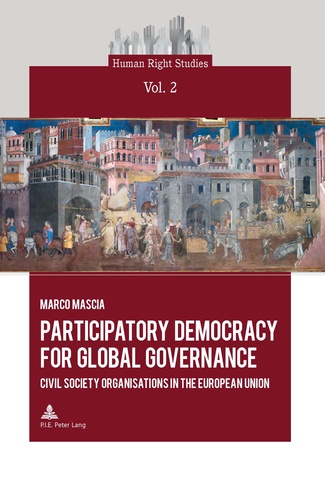Raccolte

Participatory Democracy for Global Governance
Marco Mascia (2012)
- Sito internet
- Peter Lang International Academic Publishers
- Tipologia pubblicazione
- Volume
- Casa editrice
- Peter Lang
- Città
- Bruxelles
- Pagine
- 170
- ISBN
- 978-2-87574-008-3
- Lingua
- IT
Book synopsis
This book provides an in-depth analysis of the way that Civil Society Organisations (CSOs) define their roles within multilateral institutions, both at the global level and, more specifically, within the European Union framework. The author argues that the use of conceptual categories such as global civil society and global governance is necessary to explain what is currently happening in the international political system in this era of globalisation.
The argument is built on the premise that CSOs are significant actors for democratic change in the architecture of world politics, standing out for their capacity to aggregate a varied range of political demands, particularly in waging high-level political/legal campaigns within more closely structured networks and in autonomous forums during major United Nations conferences. On a worldwide level, CSOs are gaining recognition for their political impact, above and beyond formal consultative status.
This book shows that the European Union, as a laboratory of innovative multi-level governance, offers many opportunities for CSOs participation, recognising them as an important part of the democratic process.
Table of contents
Introduction
CHAPTER 1 - Global Civil Society and Global Governance. Nourishing the Conceptual Scheme
1. The “Global Governance Spring”
2. Multi-level Governance
3. Networked Governance
4. Transnationalism, the Identifying Trait of the International System
5. Defining Global Civil Society
6. Civil Society Concept in the European Union
7. Cosmopolitan Democracy, Human Governance, “Neo-Gramscian” Approach
8. The International Democracy Approach in the Perspective of “Sustainable Statehood”
CHAPTER 2 - Civil Society Organisations in the United Nations Global Governance Framework
1. The Strategic Alliance Between the United Nations and Global Civil Society
2. Positional Attributes for NGOs, Sources of Empowerment
3. The ECOSOC Regime for Consultative Status
4. The Consultative Status at Other United Nations Organs
5. NGOs at UN World Conferences
6. NGOs in Dialogue with the Security Council: the “Arria Formula”
7. NGOs’ Access to International Criminal Tribunals
8. The Secretary-Generals’ Initiative for Civil Society’s Participation in the UN: “An Agenda for Peace” and the Cardoso Report
9. Reciprocal Accountability between the UN and NGOs
CHAPTER 3 - Civil Society Organisations in the European Union Governance
1. The Challenge of Participatory Democracy in the European Union System
2. Civil Dialogue and Social Dialogue
3. What EU Recognition for CSOs
3.1. The European Commission Position
3.2. The Council Position
3.3. NGOs, Parliament and the European Economic and Social Committee
4. The Treaty of Lisbon for the “Constitutionalisation” of Civil Dialogue
5. The Living Reality of European CSOs Platforms in the Light of Human Rights
6. What Representativeness for European CSOs
7. The Role of CSOs in the European Model of Multi-level Governance
CHAPTER 4 - Civil Society Organisations and the EU’s External Dialogues
1. External Dialogues of the European Union
2. Political Dialogue, What Role for CSOs
2.1. ACP/EU Political Dialogue
2.2. EU/ALC Political Dialogue
2.3. Euro-Mediterranean Political Dialogue
2.4. EU/China Political Dialogue
3. Human Rights Dialogue
3.1. Classifying Human Rights Dialogues
3.2. Civil Society Human Rights Seminar
4. How to Improve Dialogues’ Practice
Conclusions

